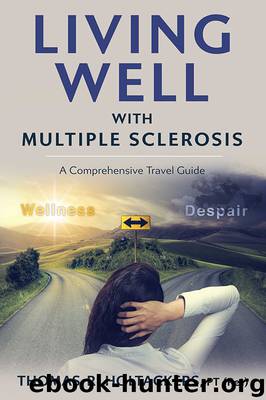Living Well With Multiple Sclerosis by Thomas Holtackers

Author:Thomas Holtackers
Language: eng
Format: epub
Publisher: BookBaby
Published: 2019-10-02T14:21:01+00:00
a. What You Do Not Use, You Lose
Lack of activity breaks down the good condition of every human being, while movement and methodical physical exercise save it and preserve it.
—Plato (429–347 B.C.; classical Greek philosopher and mathematician)
You most likely have heard it before, what you do not use, you lose. You probably are not quoting that phrase in your mind when you are so fatigued that you cannot function effectively or safely without stopping and sitting down. However, keep in mind, your muscles, your teeth, and your friends have something in common; ignore them and they will go away.
As discussed in previous chapters, rest is a negative reinforcement of the behavior of sitting down to relieve a negative, fatigue. You may literally sit in your recliner, eat snacks, and watch TV all day long. Do that too often and for too long and you will lose strength, flexibility, and endurance. It takes the concepts of total fitness to undo the affects of inactivity by changing your attitude (emotional health) toward your symptom management by learning as much about the variables of fatigue (cognitive well-being), and finding exercises and other tools that promote its management (physical fitness).
The basis of physical fitness is engaging in exercises and healthy lifestyle choices that are appropriate for you to help improve overall ability to perform activities of daily living. Exercise will improve the ability to perform activities by:
Strengthening parts of specific muscles not directly affected by multiple sclerosis and of those muscles not affected at all.
Stretching muscles and joints to increase flexibility, help manage spasticity, and prevent tightness.
Increasing endurance to help manage fatigue and appropriate body weight.
Improving sitting, standing, and walking balance.
Helping to prevent falls.
Helping to prevent or reverse osteoporosis.
Reducing emotional stress.
Making healthy lifestyle choices to help prevent:
Cardiovascular diseases.
Certain cancers.
Pulmonary diseases.
Accidents and injuries.
Following healthy nutritional guidelines to help:
Maintain appropriate weight.
Provide necessary energy.
Maintain appropriate blood sugar levels.
Prevent or reverse osteoporosis.
Download
This site does not store any files on its server. We only index and link to content provided by other sites. Please contact the content providers to delete copyright contents if any and email us, we'll remove relevant links or contents immediately.
Men In Love by Nancy Friday(5232)
Everything Happens for a Reason by Kate Bowler(4729)
The Immortal Life of Henrietta Lacks by Rebecca Skloot(4571)
Why We Sleep by Matthew Walker(4433)
The Sports Rules Book by Human Kinetics(4379)
Not a Diet Book by James Smith(3409)
The Emperor of All Maladies: A Biography of Cancer by Siddhartha Mukherjee(3143)
Sapiens and Homo Deus by Yuval Noah Harari(3061)
Day by Elie Wiesel(2779)
Angels in America by Tony Kushner(2650)
A Burst of Light by Audre Lorde(2597)
Endless Forms Most Beautiful by Sean B. Carroll(2473)
Hashimoto's Protocol by Izabella Wentz PharmD(2371)
Dirty Genes by Ben Lynch(2313)
Reservoir 13 by Jon McGregor(2300)
Wonder by R J Palacio(2203)
And the Band Played On by Randy Shilts(2197)
The Immune System Recovery Plan by Susan Blum(2057)
Stretching to Stay Young by Jessica Matthews(2036)
